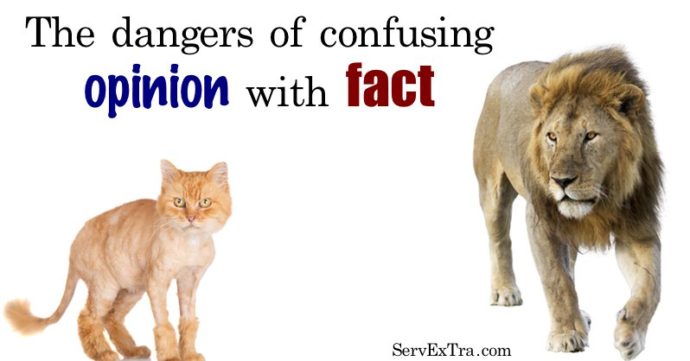Blog
The dangers of confusing opinion with fact
By Todd Liles • The dangers of confusing opinion with fact
Confusing opinion with fact is a dangerous game that should not be played. The best way to avoid this danger is to be armed with accuracy.
In Disney Pixar’s Inside Out, there is a scene where Joy and Bing Bong are on the “Train of Thought.” Joy accidentally knocks over some the cargo boxes. One is carrying “Facts” and the other is carrying “Opinions.” The facts and opinions spill all over the floor. In worry she says, “Oh no! The facts and opinions look so much alike. I can’t tell where they go.” Her buddy, Bing Bong the imaginary friend says, “Don’t worry about that. It happens all the time.” With the facts and opinions all mixed up, Bing Bong tosses them back into the boxes. RELATED – Know the facts about your company
The Dangers of Confusing Opinion with Fact
#1 – Bad decisions are made when we confuse opinions for facts
Disney cleverly highlights how we all confuse opinions for facts. This theme subtlety plays in the background of Riley’s mind (the main character). Riley gets opinions confused with facts, and decides it is best to run away from her problems, literally.
You and I have done the same thing in our life and business.
#2 – The emotion of opinions can hurt others
It hurts when someone says, “You’re not doing well in this job.” The reason it hurts, is because it is someone else’s opinion of you. Opinions are like painful judgements.
“You’re closing percentage is 32%, and the set standard is 45%.” Is a fact, not an opinion. If you feel a sting, it is the sting of your own opinion. RELATED – The Negative Little Ant
#3 – Opinions blind logic
Opinions can be very illogical. In a way, opinions are blind to logic. A person with a strong opinion can not always see the full truth. Yet, this person will feel very strongly, and be convicted by his opinion.
Opinions without facts most commonly leads to a series of bad decisions. Decisions where the outcomes have not been fully evaluated.
#4 – Communication stops when we rely solo on the emotional aspect of opinion
If you want to stop positive communication, then speak only in emotion and opinion, and leave out the facts. The conversation will be one sided, and you will always be right. However, the conversation will not be productive or beneficial.
Opinions are your truth. Your truth can be wrong to others, but not to yourself. (Hopefully, you see the bad logic here.)
It is only when we open our minds, and limit the control of emotion, that we can reach full communication.
The Importance of Accuracy
#1 – Good decisions are made when we base our opinion on the facts
I just shared with you all the reasons why opinions can lead you down a bad road. However, you still need them to make a decision.
Without getting too technical, you need to know that the decision makers in your head are your emotions. RELATED – Using the “I need to get 3 bids” objection to your advantage
Just like in Disney Pixar’s Inside Out, it is your emotions that are making the decisions of your life. Yes – I get how confusing and ironic that can be.
- Emotions make my decisions
- But, I shouldn’t make illogical emotional decisions
- I should use logic to form my opinion
- But my opinions are based in emotion
- And emotions will make my decision
It can be a little confusing. Sorry for that! Just know the following, you need the facts mixed in with your emotions. Emotions are not necessarily liars, they just need the whole picture for the best opinion.
#2 – Accuracy Increases Performance
I have seen the evidence of this in several companies. Often a company can gain an increase in closing percentage and average ticket just by sharing accurate reports.
When you give you team an accurate report, it allows them to adjust their opinion with the fact. It also avoids the bias of opinions.
I have always admired the way Alan O’Neill of Abacus Plumbing, Electrical and Cooling shares the numbers with his team.
He simply gives them the numbers in a group meeting. No one is called to the carpet for bad performance. Yet, everyone publicly knows where they stand. Achievements are document on a public scoreboard, and rewards are handed out publicly. This approach is simple, and effective.
Before your next emotional encounter, stop and ask yourself the following question: “Is this just my opinion, or do I have the have the facts straight?”
Question: Have you seen the consequences of a bad decision based on opinion? Share on Facebook and LinkedIn.
What SETs Us Apart?
Proactive Business Plans
A proactive business is a successful business. That's why our team takes the time to make sure every client has a proactive, not reactive, business plan. Our strategies make your business run more smoothly and profitable.
Proven Results
Our training services help businesses identify and achieve their key performance indicators (KPIs). Whether it's increased revenue or higher satisfaction rates, our methods allow you to see immediate and continued results.
Personalized Training
Our team of experts works hard to make sure your business gets personalized training. We'll work with your team one-on-one or in group settings to set and achieve your business goals. We develop training based on your goals!
Prioritizing People
We believe that people are the most valuable asset. We strive to provide outstanding benefits, life balance, leadership, and support to our team. We believe in helping people reach their greatest level of growth, contribution and satisfaction.

Trusted By
Business Ignition
SPARK
Classroom Training
Resources
Company

Join our newsletter











